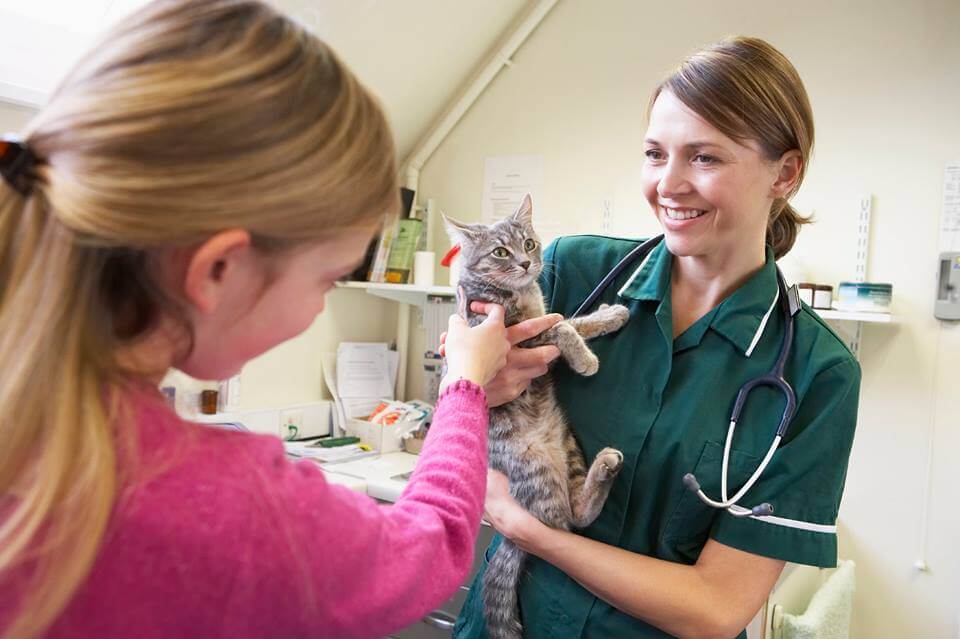Check out the Michigan Humane Society blog on Mondays to see common veterinary questions answered. If you have an immediate medical concern with your pet, please call your veterinarian! If you have a non-urgent question you would like answered on the blog, you can comment here or email us at mail(at)michiganhumane.org.
“Why does my veterinarian want both a fecal sample and a blood test to check my dog for worms?”
A fecal sample is needed to test for parasites that live in a dog or cat’s intestinal tract. Common intestinal parasites include roundworms, hookworms, coccidia, whipworms, giardia and tapeworms. Many of these parasites can be transmitted to people, especially children and immune compromised adults. Puppies and kittens should be dewormed several times and have at least two fecal samples that are free of parasites. Adult dogs and cats should have a fecal test every 6-12 months or more depending on their lifestyle.
A blood test is needed to check for heartworm disease. Adult heartworms live in the heart and associated blood vessels of an infected animal. Adult heartworms produce baby heartworms called microfilaria. Mosquitoes are needed to spread heartworm disease and both dogs and cats, even those kept indoors, are at risk. When a mosquito bites an infected animal, the microfilaria enter the mosquito and develop into larvae. When the mosquito bites another animal, it passes the larvae through the bite wound. Over the next six months the larvae develop into adult worms, unless the animal is on monthly heartworm prevention medication. The monthly prevention kills the larvae.
A blood test, called an antigen test, is used to check for proteins produced by the adult heartworms. This is the most common test done for dogs. The test should be done at least once a year, even if a dog is on year round heartworm prevention to ensure the medication is effective. Tests for microfilaria are also commonly done for dogs. Testing cats for heartworm disease can be more of a challenge. Their immune systems fight off microfilaria quickly so they usually go undetected in the blood. Cats often have less adult heartworms, so the antigen test may not be as helpful. Often times an antigen test is run along with an antibody test to determine if the cat’s immune system is responding to the presence of heartworm disease.
Check with your veterinarian about what tests are appropriate for your pet.
“My dog and cat both have fleas. How can I treat them?”
In order to control fleas, it is necessary to treat the pet and the environment. There are four stages to the flea life cycle: eggs, larvae, pupae and adult. Adult fleas live on dogs and cats, taking a blood meal, producing flea dirt (flea feces) and laying eggs. One adult female flea can lay about 50 eggs per day. The eggs fall to the ground and hatch into larvae. Larvae live in carpet, cracks in floors and shady areas outdoors. They feed on the flea dirt that falls from the pet onto the ground. The larvae develop into pupae. The pupae are protected inside a cocoon where they develop into adult fleas and wait for the proper environmental conditions, at which time they emerge and seek out a host animal, such as a dog or cat. It takes about two to three weeks for a flea to complete its lifecycle
Once monthly topical flea products such as Frontline and Revolution, will effectively control fleas on your pet if used properly. These products should be used for at least 3-4 months or longer depending on your pet’s lifestyle and the severity of the flea infestation. All animals in the house should be treated with a product that is appropriate for their weight and age. Cats are very sensitive to insecticides so make sure the product you are using is labeled safe for cats. Check with your veterinarian for appropriate flea control medication for your pet.
If you treated your pet with a topical product such as Frontline or Revolution, and you are still seeing adult fleas on your pet, it is most likely new fleas emerging from the environment and not because the product has failed. Most of the lifecycle of the flea is spent in the environment, so it is important to treat your house, and in some cases, your yard. Vacuum often, especially under beds and furniture. Wash any bedding your pet uses in hot water. A professional exterminator may be needed to treat your house and yard. Often more than one treatment is needed.
Additional prescription medications are available to control various life stages of the flea. Talk to your veterinarian about these different options to see if any are appropriate for your pet.

